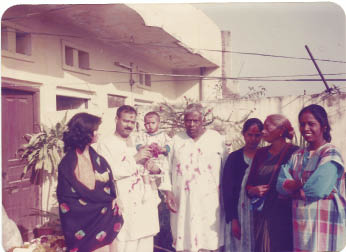Life
Ashes And Memories

The family on Holi
With all the riches acquired at sea and bruises of the voyage, we return to the harbor that once was the home and the shelter that once was the family.
Life is like a voyage through expansive seas. In youth, we set out from harbor. Our voyage navigates some high tides and some low ones, springs of sunshine and hope, and winters of despondent darkness. We exhaust our energies and our days, achieving much and losing some. Then in our adventures on the rough seas, there comes a moment when we look back at our old homestead — the nourishing place where it all began.
With all the riches acquired at sea and bruises of the voyage, we return to the harbor that once was the home and the shelter that once was the family. All that we find are ashes of the life that once was and fossils of memories.

The author as a baby, with his grandparents(center)and family members.
 It was a sultry summer afternoon in North India.
It was a sultry summer afternoon in North India.I was at the old house where I was born. Villa-2A/87 in Kanpur, Uttar Pradesh, was now a decaying old building. Yet it conspicuously stood amid the noisy bazaar as if it was the pivot of all the liveliness.
We had moved out of this house two decades earlier. My grandparents continued to live there until my grandfather passed away, when my grandmother moved in with us in New Delhi. Life went on and the house where it all began was far forgotten in the mist of memory. Now years later we were back — not to resurrect the past, but to dispose it off.
We started by moving out the big furniture — the bed on which I was first laid,
the chairs where my mother taught me my first lessons, the dining table where the family would gather for meals, the antique TV set and the wooden cupboard on which it rested.
Among the disposed furniture was my grandfather’s old table. A hefty personality, he would start his lazy mornings reading newspapers, sitting bare-chested on that table while guzzling his tea.
As noon approached, he would leisurely shave his grey stubble while listening to his old transistor radio. His silent afternoons were spent browsing with abiding interest the pages of his favorite magazines and journals.

Author’s grandfather with his closest friend Dr. Shankar Tiwari.(left).
In the evening, he would set out for the bazaars. Bazaars were not merely places where things were bought and sold. They were the mainstay of all social activities. He was a popular man and also the most loved one. He was welcomed by all — young and old alike — for he would discuss academics with the university students and the politics-of-the-day with the old, the finesse of cloth with the tailor, and medicine with the physician.
Compelled by habit, on his way back he would buy vegetables from the poorest vendor in the market.
Dr. Shankar Tiwari, who we fondly addressed by his nickname, Dr Saroja, was his closest friend and regular evening visitor. He was professor of anatomy in the district medical college, but the learned professor was a master of several academic disciplines, not just anatomy. The two old men would engross themselves in the liveliest and most intellectually stimulating conversations until late in the evenings. As men of versatile interests, their conversations would meander from politics and economics to literature, philosophy and classical music
I could not help but think of him as his old transistor radio, his watch, his table and chair were being dragged away for disposal. Choicest of his tweeds, scissored with immaculate sartorial finesse, now destroyed by moths, were bundled in a rag. The tie and the blazer that he had proudly donned as an undergraduate member of the hockey team of St. Stephen’s College, Delhi, was roughly stuffed into that bundle.

The collections now disposed off.
His small library possessed the greatest works of literature, poetry, philosophy and medicine — all ruined by termite. The literature of the ages, from Chaucer to Milton, all reduced to dirt. In the corner was a stack of his decaying half written letters, which the old man was too lazy to complete.
The ruins amid which I stood was once home. The sentiments that constitute familial experience and the endearments that define a “home,” stood fossilized among these ruins.
I decided that these debris of the home that once was, these possessions of my grandfather must not be disrespected. Perhaps the best way to pay last respects would be to surrender them to the ultimate purifier — the fire.
We lit a bonfire. As the smoke blended with familiar odor of the bazaars he once walked, one by one we consigned his possessions to the flames — his collections of tweeds, choicest of his ties, his old magazines, his favorite poems, records of his favorite music, his half written letters, his college blazer.
Fire consumed it all — the entire life that once was, leaving only ashes behind.
I had come home searching for my nourishing harbor from where my voyage had begun. And all that laid before me were ashes and memories.
Tomorrow, I shall set sail again.
.
